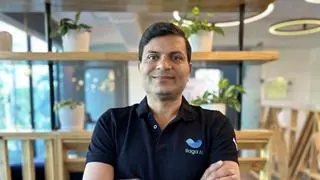Sunu Mathew had spent nearly 15 years working in multinational companies, mostly in India. It was while he was attending a management development programme at INSEAD, France, that convinced him to turn into an entrepreneur. He says three of his professors told him that his outlook to work was more like an employer’s than an employee’s. He was also looking to start a business where the entry barriers were high and one that was knowledge based.
He had handled supply chain in his corporate career and the second job he held was with CHEP, an Australian company that was probably the world’s largest in its business of pallet and container pooling. There were only four other companies that had a global presence. And, LEAP, which he started in 2013, is the sixth in the world, he says proudly. It was during his stint at CHEP that he realised that most multinationals do not understand the Indian mindset and psyche. The Indian market, Sunu emphasises, is relationship based. You have to be available 365 days a year; you cannot switch off your mobile phone at 6 pm on a Friday to again switch it on at 9 am on a Monday, as most multinational companies would do. That just doesn’t work here, he stresses.

Supply chain solutions
While at CHEP, Sunu saw there was a huge opportunity to offer supply chain solutions to customers in India, especially in pallet pooling. Over time, he invested nearly ₹4.5 crore of his own money in the venture, which has raised over ₹300 crore from venture capital and private equity players and another ₹200 crore in debt.
LEAP provides pallets, foldable large containers (FLCs) and totes that can be identified by their patented red colour. Sunu says LEAP has almost 65 per cent of the market in India and is doubling its growth every year. “We started with the automotive industry. We made FLC. Our first customer was Behr India,” says Sunu. Today, LEAP has more than 500 customers across industries.
What was the problem he was trying to solve when he started LEAP? “We were trying to solve the problem of loading and unloading. A truck cannot be loaded by putting boxes on shoulders. You have to improve the truck turnaround time,” says Sunu. If the truck turnaround time is not improved, the logistics spend will not come down to 8-9 per cent, from around 14 per cent now. The best economies work in the range of 4-5 per cent on logistics and supply chain, he adds. That can happen in India only through speed and accuracy, which will come only through palletisation.
LEAP, he says, does not manufacture the pallets, but has developed third-party manufacturers in 18 locations across the country. The company controls the three key ingredients that go into making a pallet – lumber, nails and paint. LEAP has identified and sources lumber from Russia, Germany, Estonia, Latvia, Lithuania and New Zealand; nails it gets from Korea; and, paint from France. The pallets are owned by LEAP and leased to its customers.
The company has 22 warehouses and 1.5 lakh pallets in all. It has also supplied four lakh totes to its customers, which include major online marketplaces. It has more than 3,000 touch points across the country.
According to him, LEAP will use the money that it raised in the latest round to increase the number of pallets in the market. Last year, it had a topline of ₹120 crore and hopes to end this year with a topline of ₹230-250 crore. It had an EBIDTA of ₹43 crore last year and the company hopes to report a profit after tax in 2020-21.
Overseas footprint
Going global is definitely on the cards for LEAP, according to Sunu. But that will happen only after the company has saturated the domestic market and after its growth in India slows down to 40-50 per cent.
“We have earmarked all Asian countries and one more market, which we are going to enter,” he says.








Comments
Comments have to be in English, and in full sentences. They cannot be abusive or personal. Please abide by our community guidelines for posting your comments.
We have migrated to a new commenting platform. If you are already a registered user of TheHindu Businessline and logged in, you may continue to engage with our articles. If you do not have an account please register and login to post comments. Users can access their older comments by logging into their accounts on Vuukle.